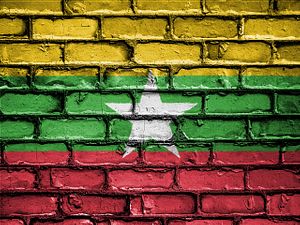The head of Indonesia’s military has expressed deep concern about the deteriorating and increasingly violent political situation in Myanmar, as a group of parliamentarians from the Association of Southeast Asian Nations (ASEAN) called for the bloc to more concerted action to solve the country’s crisis.
Speaking at the 18th ASEAN Chiefs of Defense Forces’ Meeting, which took place by video link Thursday, Air Marshal Hadi Tjahjanto took the opportunity to convey his “profound concerns about the situation in Myanmar.”
“As conveyed by the president and the foreign minister, the security and safety of the Myanmar people are paramount,” Hadi told counterparts from the other nine ASEAN member states, including Myanmar.
He added that the Indonesian military was “always ready to provide assistance and share its experience in building professional armed forces in the context of a democracy,” Hadi said, referring to his country’s transition to democratic rule after the fall of President Suharto in 1998.
Meanwhile, protests against Myanmar’s coup d’etat continue to grind on, in the face of an increasingly violent assaults by the security forces. According to the most recent daily briefing by the Assistance Association for Political Prisoners, 224 people have been confirmed killed in anti-coup protests, in addition to 2,258 who have been arrested, charged or sentenced in relation to the resistance to military rule.
Since the coup on February 1, many outside nations have looked to ASEAN to take the lead in resolving the political crisis that has resulted.
As the comments by Hadi Tjahjanto suggest, the Indonesian government in particular has sought to play an active role in diplomatic efforts aimed at ending the crisis. Shuttle diplomacy by Foreign Minister Retno Marsudi was crucial in convening the informal meeting of ASEAN foreign ministers on March 2, to discuss the Myanmar crisis.
Despite her best efforts, however, the meeting failed to reach a consensus on demanding the immediate reversal of the coup and release of State Counselor Aung San Suu Kyi and other detained senior members of the National League for Democracy government. A joint statement issued at its close merely “called on all parties to refrain from instigating further violence, and for all sides to exercise utmost restraint as well as flexibility,” while engaging in “constructive dialogue.”
With ASEAN’s diplomatic appearing to have stalled, six Southeast Asian parliamentarians have called on the 10-nation bloc to take more concerted action to the crisis from Myanmar, including expelling Myanmar from the regional grouping if the military junta refuses to back down.
The joint statement, initiated by Cambodia’s exiled opposition leader Sam Rainsy, said regional governments in the 10-nation bloc needed to abandon “the old doctrine of non-interference” in the affairs of other states and consider imposing economic sanctions on the country.
“The events in Myanmar display, yet again, the impotence of ASEAN governments in dealing with a regional crisis,” read the statement, which called for the junta to free all political prisoners, respect the November 2020 election result, and bring to justice those who have shot protesters and committed other human rights abuses.
Failing these actions, the statement suggested, “all other ASEAN governments must united and suspend Myanmar’s membership of ASEAN and thereafter impose targeted trade and economic sanctions against the military junta and their associates.”
The other signatories of the statement included Malaysian opposition leader Anwar Ibrahim, Indonesian lawmaker Fadli Zon, Philippine Senator Kiko Pangilinan, former Singapore Deputy Speaker Charles Chong, and former Thai Foreign Minister Kasit Piromya.
In reality, ASEAN is in a difficult position. While its own sluggish reaction has failed to resolve the situation thus far, the same is true of all nations’ efforts – and it is far from certain that kicking Myanmar out of ASEAN and imposing sanctions would guarantee a better outcome.
As I’ve argued before, much of the world community is looking to ASEAN to lead diplomatic efforts aimed at resolving what is perhaps an unsolvable crisis. Ben Bland of Sydney’s Lowy Institute summed up the bloc’s dilemma in an article this week: “While the risks for ASEAN member states are high,” he wrote, “the options for action are few.”

































